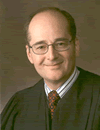Hon. Charles Canady
Florida Supreme Court (2008-Present, 2010-2012 as Chief Justice); Florida Second District Court of Appeal (2002-2008); United States House of Representatives (1993-2001)
Using our initial screen to find cases, Judge Canady wrote or joined an opinion in two First Amendment cases of note while on the Florida Supreme Court.
The first was In re Turner, 76 So. 3d 898 (Fla. 2011). This case involved a Florida judge’s serious misconduct both while campaigning for the bench and after winning election. Of the six counts against Judge N. James Turner where he was found guilty by the Florida Judicial Qualifications Commission, two were campaign finance allegations. One count involved personally soliciting campaign funds in violation of Florida Judicial Canon 7C(1), and the other was a clear violation of a Florida contribution limit. Judge Turner argued the personal solicitation rule violated his First Amendment rights. The Florida Supreme Court declined to hear the issue as the other violations warranted Turner’s removal from the bench. Internal citations of supporting legal authority have been omitted from the quoted opinion below.
Judge Canady concurred in the result, but argued the Court should have heard Turner’s constitutional challenge to the personal solicitation ban. Judge Canady’s opinion is laudable for two reasons. First, it is very protective of First Amendment rights, particularly the rights of candidates for office. Second, he also shows a willingness to reach the constitutional issue, which judges are often reluctant to do. But his willingness to rule in this case is undercut by a mysterious silence in a later case on the same question.
The constitutionality of Florida’s solicitation rule was later decided in Williams-Yulee v. Florida Bar. In that case, Florida’s high court upheld the rule under the First Amendment. Chief Justice Ricky Polston and Justice Canady concurred in part and dissented in part. But we do not know which parts or why. In 2015, the U.S. Supreme Court affirmed the Florida Court ruling in a 5-4 decision.
In Turner, Canady wrote:
Proper judicial restraint does dictate that when legislative or executive action is challenged on constitutional grounds, the courts should avoid the constitutional issue if the case can be decided on other grounds. This principle of judicial restraint has no proper application where the constitutional challenge is to a judicially adopted rule which trenches on constitutional rights…
When presented with a case which properly presents a constitutional challenge to a rule we have adopted, we should not decline to address it but should use the opportunity to ensure that we have exercised our rule-making power in a way that is consistent with constitutional requirements. If Canon 7C(1) violates the First Amendment, Florida state judges who wish to vindicate their First Amendment rights should not be required to seek relief in federal court or in state circuit court while the Florida Supreme Court remains silent.
Judge Canady argued he would hold that the personal solicitation rule violated the First Amendment under strict scrutiny:
Because Canon 7C(1) prohibits speech by candidates based on the content of that speech, it is subject to strict scrutiny review… We have previously recognized that Florida has ―a compelling state interest in preserving the integrity of our judiciary and maintaining the public‘s confidence in an impartial judiciary. Canon 7C(1) fails, however, to meet the requirements of the First Amendment because it was not narrowly tailored to serve this interest.
Judge Canady relied heavily on a well-cited Sixth Circuit opinion on the subject:
Prohibiting candidates from asking for money suppresses speech in the most conspicuous of ways and, in the process, favors some candidates over others—incumbent judges (who benefit from their current status) over non-judicial candidates, the well-to-do (who may not need to raise any money at all) over lower-income candidates, and the well-connected (who have an army of potential fundraisers) over outsiders. For these reasons, it is tempting to say that any limitation on a candidate‘s right to ask for a campaign contribution is one limitation too many. Carey v. Wolnitzek, 614 F.3d 189, 204 (6th Cir. 2010).
He then argued under this standard that Florida’s personal solicitation clause is also unconstitutional:
I similarly conclude that Florida‘s interest in preserving the actual and apparent impartiality of Florida‘s judiciary is not significantly protected by Canon 7C(1). Canon 7C(1) completely chills a candidate‘s speech regarding contributions while providing only marginal protection against actual or perceived judicial bias. I therefore conclude that Canon 7C(1) encroaches on the free speech rights of judicial candidates in violation of the First Amendment of the United States Constitution.
When the U.S. Supreme Court reviewed the same rule in Williams-Yulee v. Florida Bar, Justice Scalia, joined by Justice Thomas, strongly dissented. Justices Kennedy and Alito also dissented separately.
Justice Scalia concluded in his dissent that “[The] judges of this Court, like the judges of the Supreme Court of Florida who promulgated Canon 7C(1), evidently consider the preservation of public respect for the courts a policy objective of the highest order. So it is—but so too are preventing animal torture, protecting the innocence of children, and honoring valiant soldiers. The Court did not relax the Constitution’s guarantee of freedom of speech when legislatures pursued those goals; it should not relax the guarantee when the Supreme Court of Florida pursues this one. The First Amendment is not abridged for the benefit of the Brotherhood of the Robe.”













